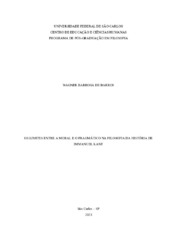Os limites entre a moral e o pragmático na filosofia da história de Immanuel Kant
Resumen
The objective of this thesis is to analyze Immanuel Kant's Philosophy of History insofar as we seek to circumscribe how the pragmatic field collaborates or favors the fulfillment of what is established as a moral end to humankind. The Kantian Philosophy of History deals with the investigation of the history of human beings actions, with the intention of finding in it, despite the woven of folly and puerile caprice, a regular course of development of all their dispositions according to a natural purpose. Leaning on its own effort, humankind is under obligation to break away from its animality and, through its reason, progress gradually to the inner perfection of the way of thinking, which, in Kantian practical philosophy, appears as the production of a good will. According to the German philosopher, a good will is good, not because of its effects and accomplishments, or even because of its efficacy to achieve them, but only because of the purity of its maxim, that is, it is good in itself. In his essays on the Philosophy of History and in those other texts that also deal with its concepts, Kant stipulates – in accordance with what his Moral Philosophy establishes – the progressive path to be promoted by the humankind from one generation to the next: it must be disciplined, cultivated, civilized and, finally, moralized. In consideration of this gradual development with a moral purpose, it becomes necessary to understand how, in a philosophically thought history, humankind should and can endeavor this purpose, that is, what is the role played by the pragmatic field, delimited by the exercise of prudence, in the promotion of human moralization; in other words, what is the potential that the formative expedients of Anthropology and Education, as well as the coercive resources of Politics and Right exert in the production of a good will. Our thesis is that there is a proper limit between the moral and the pragmatic field, that is, that the moralization of the humankind cannot result from any incentive or imposition, because it is, by principle, a free and autonomous action, however, one can only reach this condition, in which the step towards morality is made possible, if it has previously promoted the pragmatic progress necessary for this conjuncture. Thereby, we affirm that the progress of the pragmatic field is fundamental for human moralization, but, as one gets increasingly closer to it, the less strength it has to push it in that direction, leaving, in the end, to the individual oneself to carry it out.
Colecciones
El ítem tiene asociados los siguientes ficheros de licencia:

